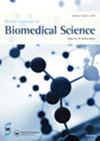Andragogy in Practice: Applying a Theoretical Framework to Team Science Training in Biomedical Research
IF 2.7
4区 医学
Q2 MEDICAL LABORATORY TECHNOLOGY
引用次数: 0
Abstract
This study is the first to apply the theoretical principles of Malcolm Knowles’ theory of andragogy to evaluate data collected from learners who participated in team science training workshops in a biomedical research setting. Briefly, andragogy includes six principles: the learner’s self-concept, the role of experience, readiness to learn, orientation to learning, the learner’s need to know, and intrinsic motivation. Using an embedded study design, the primary focus was on qualitative data, with quantitative data complementing the qualitative findings. The deductive analysis demonstrated that approximately 85% of the qualitative data could be connected to at least one andragogical principle. Participant responses to positive evaluation questions were largely related to two principles: readiness to learn and problem-based learning orientation. Participant responses to negative questions were largely connected to two different principles: the role of experience and self-direction. Inductive analysis found an additional theme: meeting biological needs. Quantitative survey results supported the qualitative findings. The study findings demonstrate that andragogy can serve as a valuable construct to integrate into the development of effective team science training for biomedical researchers.实践中的教育学:将理论框架应用于生物医学研究中的团队科学培训
本研究首次应用马尔科姆-诺尔斯(Malcolm Knowles)的教学法理论原则,对在生物医学研究环境中参加团队科学培训研讨会的学习者收集的数据进行评估。简而言之,教学法包括六项原则:学习者的自我概念、经验的作用、学习准备、学习导向、学习者的求知需要和内在动机。采用嵌入式研究设计,主要关注定性数据,定量数据对定性结果进行补充。演绎分析表明,大约 85% 的定性数据可以与至少一个教学法原则联系起来。参与者对正面评价问题的回答主要与两个原则有关:学习准备和基于问题的学习导向。学员对负面问题的回答主要与两个不同的原则有关:经验的作用和自我导向。归纳分析发现了另一个主题:满足生理需求。定量调查结果支持定性调查结果。研究结果表明,"教学法 "可以作为一种有价值的构建方法,用于为生物医学研究人员开展有效的团队科学培训。
本文章由计算机程序翻译,如有差异,请以英文原文为准。
求助全文
约1分钟内获得全文
求助全文
来源期刊

British Journal of Biomedical Science
医学-医学实验技术
CiteScore
4.40
自引率
15.80%
发文量
29
审稿时长
>12 weeks
期刊介绍:
The British Journal of Biomedical Science is committed to publishing high quality original research that represents a clear advance in the practice of biomedical science, and reviews that summarise recent advances in the field of biomedical science. The overall aim of the Journal is to provide a platform for the dissemination of new and innovative information on the diagnosis and management of disease that is valuable to the practicing laboratory scientist.
 求助内容:
求助内容: 应助结果提醒方式:
应助结果提醒方式:


